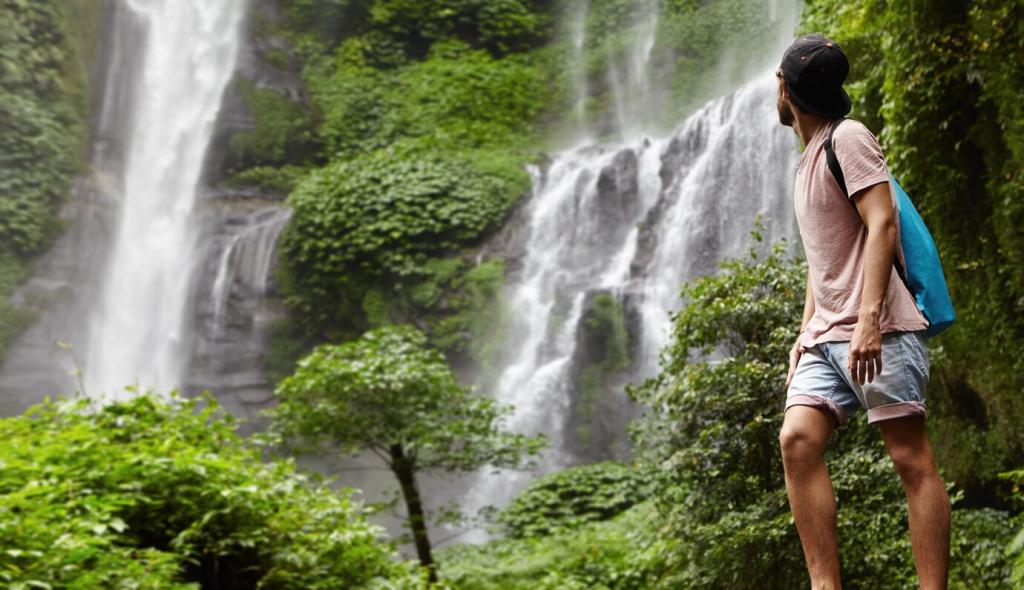Eco-Friendly Travel Destinations
Eco-friendly travel destinations have become increasingly popular as more travelers seek to minimize their environmental impact while exploring the world. These destinations are committed to sustainable tourism, conservation of natural resources, and supporting local communities. From lush rainforests to vibrant urban spaces, eco-friendly destinations offer unique experiences that allow visitors to immerse themselves in nature, culture, and responsible travel practices. In this guide, discover inspiring places that are leading the way in sustainable travel, along with insights on what makes them remarkable havens for eco-conscious explorers.


Costa Rica: A Haven for Eco-Adventurers
Costa Rica is synonymous with eco-friendly tourism, having devoted a third of its territory to protected national parks and reserves. The country’s sustainable tourism model encourages travelers to explore cloud forests, volcanic peaks, and wildlife-rich coastlines while supporting conservation and community development. Whether ziplining through Monteverde’s misty canopy or volunteering with sea turtle conservation projects, visitors witness firsthand the benefits of responsible tourism. Local eco-lodges set the standard for green accommodation, utilizing renewable energy and minimizing waste, making Costa Rica a trailblazer in ecotourism.

Borneo: Protecting Rainforest Biodiversity
Borneo’s lush rainforests harbor some of the oldest and most diverse ecosystems on Earth, home to iconic wildlife like orangutans, pygmy elephants, and rare hornbills. Conservation-focused travel in Borneo emphasizes low-impact adventure and supports grassroots initiatives dedicated to habitat preservation and species protection. Guided treks through ancient jungle trails, ethical wildlife encounters, and community-run ecolodges immerse travelers in the marvels of the tropics while directly aiding essential conservation work. Borneo demonstrates how responsible tourism can sustain both biodiversity and indigenous cultures reliant on the forest.

Seychelles: Stewardship of Marine and Island Environments
The Seychelles archipelago stands as a beacon of sustainable island tourism, blending luxurious experiences with steadfast conservation. The nation has created vast marine protected areas, pioneered coral restoration, and strictly manages visitor numbers to safeguard both land and sea treasures. Travelers are welcomed to pristine beaches, turquoise waters, and nature reserves teeming with endemic species, with educational programs encouraging environmental stewardship. Eco-conscious resorts operate with minimal environmental impact, enabling visitors to relax in paradise while contributing to vital preservation efforts across the islands.
Mountain Retreats and Alpine Conservation Efforts
Switzerland: Pioneering Responsible Alpine Tourism
Switzerland’s mountains are iconic, drawing adventure seekers and nature lovers alike. The country’s dedication to sustainable tourism is evident through well-managed hiking trails, extensive public transit, and strict environmental guidelines that protect alpine habitats. Swiss villages, such as Zermatt, minimize car use and rely on electric vehicles, further reducing emissions in ecologically sensitive areas. Visitors enjoy panoramic rail journeys, eco-labeled accommodations, and local produce, all curated to respect the delicate balance of mountain ecosystems. Switzerland demonstrates that sustainable practices and classic hospitality can elevate the mountain travel experience.
Bhutan: High-Altitude Harmony with Nature
Nestled in the Himalayas, Bhutan is celebrated for its visionary “Gross National Happiness” policy, which prioritizes environmental sustainability and cultural preservation over mass tourism. Bhutan limits visitor numbers and imposes a daily tourism fee to maintain a high-value, low-impact approach, ensuring that both natural and cultural treasures remain unspoiled. Ancient monasteries, wildflower meadows, and dramatic peaks await those who travel mindfully. Visitors support local communities through homestays and guided trekking, forming respectful connections with the land and its guardians while contributing to the well-being of Bhutan’s people and environment.
New Zealand: Guardianship of Rugged Landscapes
New Zealand’s landscapes, shaped by volcanic activity and glacial forces, offer a sanctuary for rare species and unique ecosystems. The country’s longstanding commitment to the Māori principle of kaitiakitanga—guardianship of the land—informs robust conservation efforts, sustainable tourism guidelines, and evidence-based wilderness management. From the Southern Alps to Fiordland’s ancient rainforests, there are abundant opportunities to hike, kayak, and discover wildlife in protected settings. Eco-lodges, local conservation trusts, and immersive tours invite travelers to become active participants in safeguarding New Zealand’s remarkable natural heritage.
Wildlife Sanctuaries and Ethical Safaris
Kenya’s celebrated national parks and private conservancies have become models of community-engaged conservation, offering wildlife tourism that finances habitat protection and benefits local peoples. Ethical safari operators minimize environmental footprints, restrict off-road driving, and adhere to principles of respectful animal observation. Guests are often invited to meet Maasai and Samburu communities, gaining insight into traditional conservation wisdom and co-management of wildlife areas. Through responsible practices, Kenya’s tourism sector sustains iconic species like elephants, lions, and rhinos, ensuring visitors witness the wonders of the savanna while partaking in its ongoing protection.
The Galápagos Islands are an extraordinary example of nature conserved through limited, carefully managed tourism. Ecuador enforces strict visitor quotas, ship size limits, and naturalist-led tours to ensure guests have minimal impact on this UNESCO World Heritage Site. Unique wildlife—including giant tortoises, marine iguanas, and blue-footed boobies—thrive due to these protections. Eco-lodges and sustainable tour operators on the islands work closely with scientists and local authorities to educate travelers on the importance of preserving both terrestrial and marine environments. The Galápagos remains a living laboratory for evolution and a testament to effective stewardship.
The Australian island of Tasmania boasts remote wilderness areas, ancient rainforests, and fertile valleys that provide safe havens for rare and endemic wildlife, including the endangered Tasmanian devil. Conservation parks, wildlife sanctuaries, and community-led ecotourism ventures allow visitors to experience Tasmania’s ecological richness in ways that contribute directly to ongoing protection efforts. Responsible nocturnal tours, volunteer opportunities, and partnerships with indigenous custodians deepen travelers’ understanding of Australia’s unique fauna and habitats. Tasmania’s approach highlights how tourism can create lasting benefits for wildlife, communities, and travelers alike.
Sustainable Islands and Marine Conservation
Located in the heart of Micronesia, Palau is internationally recognized for its dedication to marine protection and sustainable tourism. As the world’s first country to require an eco-pledge upon entry, Palau holds visitors accountable for their conduct, reinforcing a culture of environmental respect. Its marine sanctuary—the largest in the world—prohibits commercial fishing and enables healthy coral reefs to support vibrant marine life. Eco-resorts, dive operators, and cultural experiences are all curated with an emphasis on ecological stewardship, ensuring that guests make lasting connections with both the ocean and Palauan heritage.

Japan’s Satoyama: Living in Harmony with Nature
Japan’s satoyama, or rural landscapes nestled between mountains and cultivated fields, offer visitors a glimpse into traditional land stewardship and sustainable living. Villages like Shirakawa-go and those in the Noto Peninsula exemplify centuries-old practices of integrating forestry, agriculture, and wildlife habitats for mutual benefit. Supported by eco-tourism initiatives, these communities encourage hands-on experiences such as rice planting, beekeeping, and guided forest walks. Travelers can stay in heritage farmhouses, savor local cuisine, and learn about innovative uses of natural resources that have been passed down for generations.
Italy’s Agriturismos: Farm Stay Sustainability
Italian agriturismos are rural farmhouses and estates that open their doors to guests eager to immerse themselves in sustainable agriculture. These working farms produce organic foods, wine, and olive oil using traditional methods that champion biodiversity and resource conservation. Travelers participate in farm activities, culinary workshops, and wine tastings, fostering deep connections to the land and its care. The agriturismo model revitalizes rural economies, supports artisanal craftsmanship, and promotes regional identities while adhering to the principles of slow, low-impact tourism that benefits both host and visitor.
Morocco’s Berber Villages: Ancient Wisdom and Eco-Tourism
Nestled in the Atlas Mountains and desert fringes, Morocco’s Berber villages are bastions of sustainable living shaped by centuries of adaptation to extreme environments. Community-led tourism projects offer trekking, homestays, and cultural workshops, allowing travelers to witness ancient irrigation systems, earthen architecture, and time-honored crafts. These experiences empower local women’s cooperatives and invest in education and healthcare. By choosing to visit Morocco’s rural heartlands, travelers not only enjoy spectacular scenery and heartfelt hospitality but play an active role in preserving unique cultural heritages and natural landscapes.
Previous
Next
Wellness, Wellness, and Eco-Conscious Retreats
Bali: Wellness Resorts in Balance with Nature
Bali has long drawn visitors seeking spiritual renewal, and its leading wellness resorts showcase extraordinary commitments to sustainability. Built with locally sourced bamboo and natural materials, these sanctuaries offer yoga, meditation, and farm-to-table dining in serene tropical settings. Many resorts operate organic farms, solar-powered facilities, and waste recycling programs, ensuring their operations benefit both guests and the surrounding communities. Bali’s blend of environmental consciousness and rich cultural heritage creates a holistic wellness experience, inviting travelers to cultivate both personal and planetary harmony.

